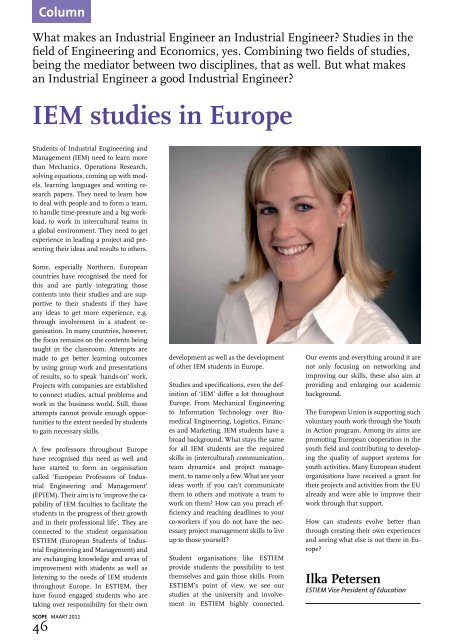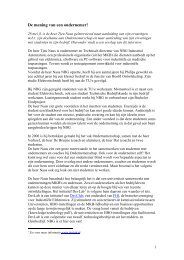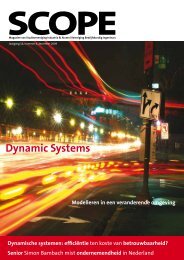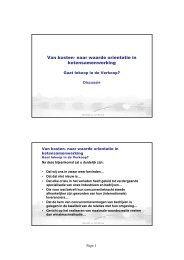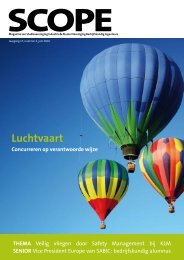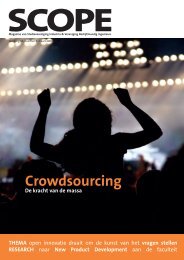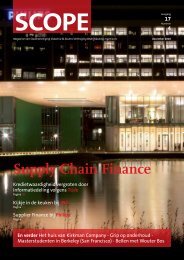You also want an ePaper? Increase the reach of your titles
YUMPU automatically turns print PDFs into web optimized ePapers that Google loves.
Column<br />
What makes an Industrial Engineer an Industrial Engineer? Studies in the<br />
field of Engineering and Economics, yes. Combining two fields of studies,<br />
being the mediator between two disciplines, that as well. But what makes<br />
an Industrial Engineer a good Industrial Engineer?<br />
IEM studies in Europe<br />
Students of Industrial Engineering and<br />
Management (IEM) need to learn more<br />
than Mechanics, Operations Research,<br />
solving equations, coming up with models,<br />
learning languages and writing research<br />
papers. They need to learn how<br />
to deal with people and to form a team,<br />
to handle time-pressure and a big workload,<br />
to work in intercultural teams in<br />
a global environment. They need to get<br />
experience in leading a project and presenting<br />
their ideas and results to others.<br />
Some, especially Northern, European<br />
countries have recognised the need for<br />
this and are partly integrating those<br />
contents into their studies and are supportive<br />
to their students if they have<br />
any ideas to get more experience, e.g.<br />
through involvement in a student organisation.<br />
In many countries, however,<br />
the focus remains on the contents being<br />
taught in the classroom. Attempts are<br />
made to get better learning outcomes<br />
by using group work and presentations<br />
of results, so to speak ‘hands-on’ work.<br />
Projects with companies are established<br />
to connect studies, actual problems and<br />
work in the business world. Still, those<br />
attempts cannot provide enough opportunities<br />
to the extent needed by students<br />
to gain necessary skills.<br />
A few professors throughout Europe<br />
have recognised this need as well and<br />
have started to form an organisation<br />
called ‘European Professors of Industrial<br />
Engineering and Management’<br />
(EPIEM). Their aim is to ‘improve the capability<br />
of IEM faculties to facilitate the<br />
students in the progress of their growth<br />
and in their professional life’. They are<br />
connected to the student organisation<br />
ESTIEM (European Students of Industrial<br />
Engineering and Management) and<br />
are exchanging knowledge and areas of<br />
improvement with students as well as<br />
listening to the needs of IEM students<br />
throughout Europe. In ESTIEM, they<br />
have found engaged students who are<br />
taking over responsibility for their own<br />
<strong>SCOPE</strong> MAART 2011<br />
46<br />
development as well as the development<br />
of other IEM students in Europe.<br />
Studies and specifications, even the definition<br />
of ‘IEM’ differ a lot throughout<br />
Europe. From Mechanical Engineering<br />
to Information Technology over Biomedical<br />
Engineering, Logistics, Finances<br />
and Marketing, IEM students have a<br />
broad background. What stays the same<br />
for all IEM students are the required<br />
skills in (intercultural) communication,<br />
team dynamics and project management,<br />
to name only a few. What are your<br />
ideas worth if you can’t communicate<br />
them to others and motivate a team to<br />
work on them? How can you preach efficiency<br />
and reaching deadlines to your<br />
co-workers if you do not have the necessary<br />
project management skills to live<br />
up to those yourself?<br />
Student organisations like ESTIEM<br />
provide students the possibility to test<br />
themselves and gain those skills. From<br />
ESTIEM’s point of view, we see our<br />
studies at the university and involvement<br />
in ESTIEM highly connected.<br />
Our events and everything around it are<br />
not only focusing on networking and<br />
improving our skills, these also aim at<br />
providing and enlarging our academic<br />
background.<br />
The European Union is supporting such<br />
voluntary youth work through the Youth<br />
in Action program. Among its aims are<br />
promoting European cooperation in the<br />
youth field and contributing to developing<br />
the quality of support systems for<br />
youth activities. Many European student<br />
organisations have received a grant for<br />
their projects and activities from the EU<br />
already and were able to improve their<br />
work through that support.<br />
How can students evolve better than<br />
through creating their own experiences<br />
and seeing what else is out there in Europe?<br />
Ilka Petersen<br />
ESTIEM Vice President of Education


